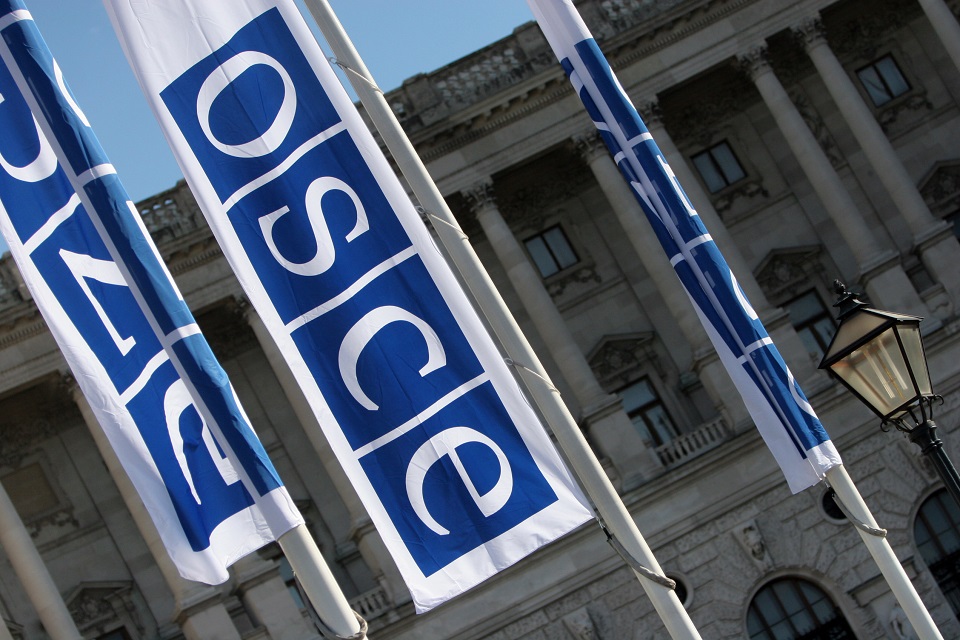
Thank you Madame Chair for dedicating this Joint FSC/PC Security Dialogue to the important topic of UNSCR 1325 on Women, Peace and Security. Thanks also to our speakers for their excellent presentations, which serve to reinforce the importance of gender equality in achieving sustainable peace and security.
This morning we have an important opportunity to capitalise on the momentum generated at OSCE last year around the Resolution’s 20th anniversary, to recognise the remaining implementation gaps, and work together through the Forum for Security Co-operation (FSC) to promote the further implementation of this landmark Resolution.
The unanimously adopted UNSCR 1325 recognised the disproportionate impact of conflict on women and girls. It also stressed the importance of women’s equal and full participation as active agents in peace and security and highlighted the need to increase the participation and representation of women at all levels of decision-making.
Madame Chair, we have a moral imperative to act. Women’s rights are human rights, and full implementation of UNSCR 1325 and all subsequent resolutions is an essential step towards ensuring the equal rights of women and girls. We must make it our collective ambition to ensure women meaningfully participate in all aspects of decision-making. In the security sector and in peacebuilding, women must be included in all decisions that affect their lives.
But there is a practical imperative too. The full, equal and meaningful participation of women in decision-making processes leads to better decision-making and more durable solutions. The evidence is clear. Countries with high levels of gender based discrimination are more likely to experience intra- and interstate conflict. Countries which have more fair and equal access to opportunities tend to be stable and peaceful. In peace processes where women are able to exert strong influence, it is much more likely that an agreement will be reached and implemented, and the peace is 35% more likely to last for fifteen years.
The UK supports the International Civil Action Network’s Protection Framework for women peacebuilders. OSCE and participating States’ support and implementation of this Framework can help protect women peacebuilders and facilitate greater involvement of women in peace processes at all levels of leadership.
Madame Chair, it is right that we ask ourselves today what additional measures at the OSCE could further the implementation of UNSCR 1325. Happily, we have a clear menu of concrete suggestions listed in the statement supported by 52 participating States at last year’s Ministerial Council.
Some of these involve the use of mechanisms already at our disposal, including the 2019 toolkit ‘Inclusion of Women and Effective Peace Processes’, further development of National Actions Plans on WPS, and the provision of information on WPS through the Code of Conduct.
Others suggest the compilation of national practices in implementing UNSCR 1325 and sharing of best practices regarding the full, equal and meaningful participation of women in conflict prevention, conflict resolution and post-conflict rehabilitation. The remaining measures are really about ensuring the FSC’s own house is fully in order, by establishing and implementing a plan of action for the full, equal and meaningful participation of women, in all aspects of the FSC’s work, including at all levels of decision-making and leadership, and gender mainstreaming in our Small Arms and Light Weapons (SALW) and Stockpiles of Conventional Ammunition (SCA) work.
Madame Chair, we disagree with any suggestion that furthering UNSCR 1325 is somehow not the business of the OSCE in general or the FSC in particular. Ensuring that around 50% of the population have full, meaningful and equal participation to decisions on peace and security is everyone’s business. And as members of the world’s largest regional security organisation, it is incumbent on us all to lead the way.
The Tirana joint statement on UNSCR 1325 makes clear the overwhelming support of participating States for enhanced action in the OSCE on WPS. I would therefore like to end with a direct and respectful appeal to the five states who did not join consensus at the Tirana Ministerial Council. That appeal is to reconsider, take a careful look at the measures proposed in the joint UNSCR 1325 statement in Tirana, and join the 52 other participating States to engage constructively in OSCE fora and the FSC in particular, so that we can make 2021 a year of real progress on women, peace and security.